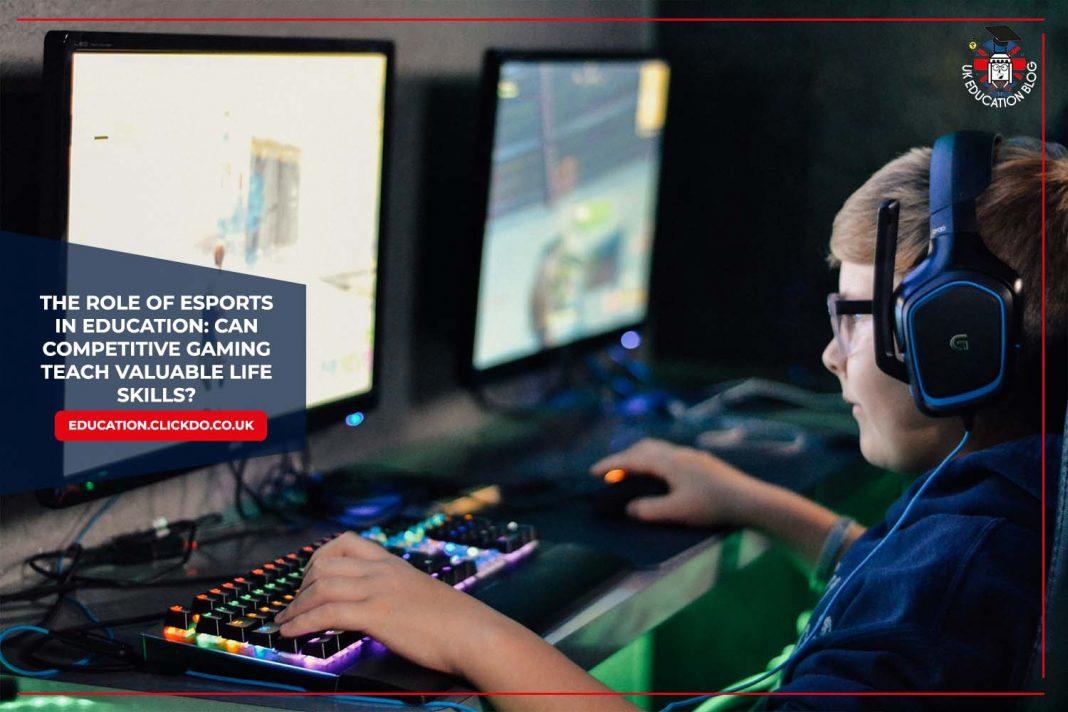The esports community has evolved from a niche interest into a multi-billion-dollar industry almost overnight.
Competitive gaming was once seen as a hobby by gamers and an unwelcome distraction to students by parents, but it has gained recognition in educational and professional realms.
Academic institutions are increasingly integrating esports into their curricula and extracurricular activities; Sheffield Hallam University, University of Suffolk, and Nottingham Trent University offer esports degree courses.
Is there educational value in esports? Are esports a pastime, or can they genuinely teach valuable life skills? The answer lies in esports’ potential to foster critical thinking, promoting teamwork, problem-solving, and leadership.
The Rise of Esports in Education

As eGaming and esports have grown in popularity, more schools and universities have started offering dedicated esports programmes, with some going as far as offering scholarships to talented gamers.
In the United Kingdom, the British Esports Federation has partnered with educational institutions to promote esports as a viable career path, while organisations like The Association for UK Interactive Entertainment (Ukie) are working on creating educational frameworks for esports in schools.
Critical Thinking and Problem-Solving
Critical thinking is one of the essential skills developed through competitive gaming. Most esports titles require players to continually assess and reassess situations, make quick decisions, and predict opponents’ moves with limited, ever-changing information. To succeed, players must understand the game’s rules while being able to think several steps ahead to outmanoeuvre their opponents. These skills become instrumental in academic subjects such as mathematics and science, where students must solve complex problems using logical reasoning and analysis.
Problem-solving is not a solitary activity in esports. Players work together to develop strategies, communicate effectively, and adapt to evolving game scenarios. This collaborative problem-solving process mirrors how professionals in business, engineering, and even medicine work together to tackle challenges and obstacles.
Teamwork and Communication

Although some esports are individual events, the industry is dominated by team-orientated activities. Popular titles like Counter-Strike: Global Offensive and Overwatch require players to coordinate their actions, communicate clearly and effectively, and trust their teammates to fulfil their roles. Most successful esports teams have a standout player who is supremely talented, but the elite-level teams show seamless collaboration and teamwork.
In any professional setting, employees must work as part of a team and rely on one another to succeed. Esports offers students a high-pressure, dynamic environment to develop these essential life skills.
Additionally, esports foster leadership qualities. Teams have captains and in-game leaders who are responsible for making strategic decisions on the fly and keeping their team members motivated. The skills esports captains learn and develop can stand them in good stead for leading teams in future professional settings.
Emotional Resilience and Adaptability
Developing emotional resilience is one of the less obvious benefits of esports. Competitive gaming is highly stressful, and players face the pressures of winning and losing in real time. Gaming students learn to manage the lows associated with defeat while learning to be gracious in victory.
Competitive gamers are among the most adaptable people you will meet. The fast-paced nature of esports forces players to adjust their strategies on the fly, teaching them to pivot and think quickly in real-time. Quick decision-making and pivoting to a changing landscape are invaluable skills in many real-world scenarios.
Perhaps best of all is how esports teach students that failure is not the end but an opportunity to learn, adjust strategies, and improve performance. They learn that, sometimes, you can give your all and work seamlessly as a team but still lose due to an unforeseen outside influence or an unforced error. Teams often analyse their performances after a game or match to learn from their mistakes and enable them to improve as a group moving forward. This collaborative analysis and learning can be applied to any industry.
Career Opportunities in Esports

Esports present students with tangible career opportunities beyond skill development. The esports industry is worth billions of dollars and has grown to include many potential careers. These include professional players, game developers, analysts, broadcasters, and marketing professionals. The demand for skilled individuals in these roles increases as the esports industry grows rapidly.
Educational programmes involving esports are not only about cultivating the best gaming talent. They also prepare students for broader opportunities within the industry. For example, courses may include modules on game design and media production or digital marketing and event management. Students can complete and apply these modules and classes to other industries; most are not explicitly tied to esports.
Addressing Concerns About Esports in Education
Several concerns remain despite a growing acceptance of esports in education. Some critics argue that excessive gaming can lead to poor physical health and social isolation. However, correctly implemented esports programmes can help mitigate these risks. For example, they can promote physical fitness to ensure students balance gaming with regular exercise. The top-tier esports teams are mentally switched on and physically fit because they know the two are intertwined.
Non-gamers often fail to realise that esports are a highly social activity. Players build solid relationships and bonds that last a lifetime, both online and in person. They often become part of a vibrant, supportive community where they can thrive socially, which filters through their academic studies.
Conclusion
If implemented properly, esports have the potential to play a significant role in education. It gives students opportunities to develop and improve life skills, including communication, emotional resilience, problem-solving, and teamwork, all of which can be applied to non-gaming industries and scenarios.
While challenges remain, integrating esports into education offers exciting possibilities for the future of learning by making it more dynamic, inclusive, and relevant to today’s digital age. There is more to esports than sitting behind a monitor and playing games with friends; it is a vessel helping to create future leaders, critical thinkers, and problem-solvers through gaming.
Author Profile

- Shirley Owen is a blogger and writer who enjoys writing blogs on education, technology and general news. An avid reader, she follows all the latest news & developments to report on them through her articles.
Latest entries
 careerDecember 30, 2025Why BIM Mastery has become essential for Construction Professionals in 2025
careerDecember 30, 2025Why BIM Mastery has become essential for Construction Professionals in 2025 learningDecember 22, 2025When Co-parenting Affects School Performance – Challenges & Solutions
learningDecember 22, 2025When Co-parenting Affects School Performance – Challenges & Solutions educationDecember 11, 2025Making Education Accessible for Mobile Families that Travel
educationDecember 11, 2025Making Education Accessible for Mobile Families that Travel learningOctober 28, 20257 Daily Classroom Strategies Helping Children With Learning Differences Thrive
learningOctober 28, 20257 Daily Classroom Strategies Helping Children With Learning Differences Thrive







